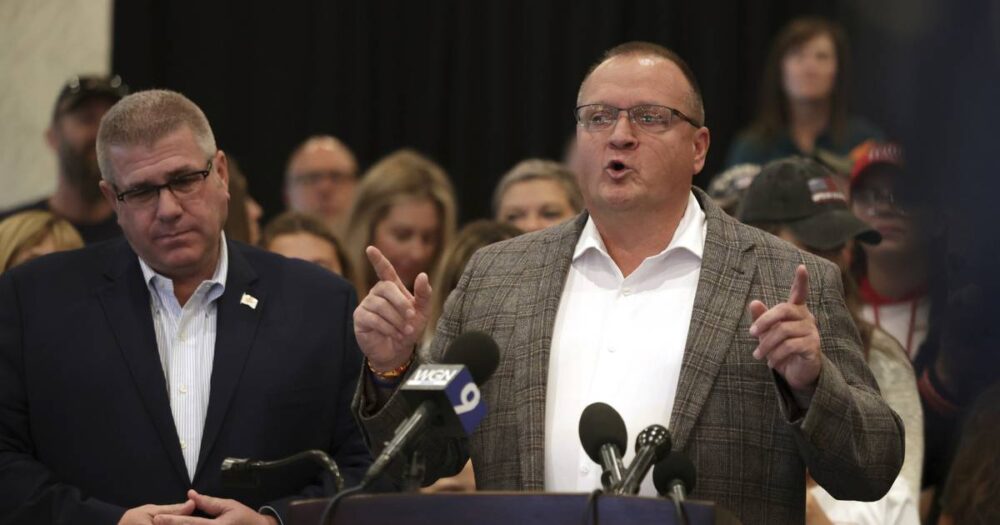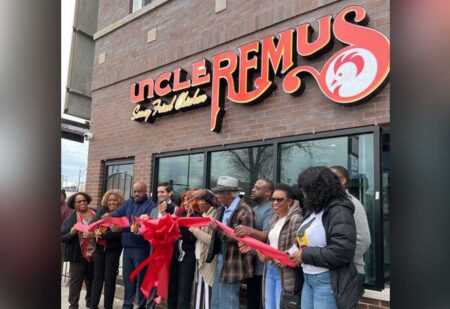A downstate judge on Tuesday dismissed a trio of lawsuits brought by a former Republican attorney general candidate challenging Illinois’ sweeping gun ban, citing last week’s state Supreme Court ruling that upheld the law in a separate case.
The outcome was expected after the high court in a 4-3 decision said the ban on an extensive list of high-power semi-automatic weapons and high-capacity magazines does not violate the state constitution’s equal protection clause.
In that case and those brought by attorney Thomas DeVore, the plaintiffs argued the law violated the constitution by creating exemptions for certain trained professionals and for people who owned the now-banned firearms at the time the prohibition took effect, among other issues.
DeVore, who last year ran unsuccessfully for attorney general, said he plans to appeal Tuesday’s lower court ruling. In addition, the gun ban is still being challenged on Second Amendment grounds in federal court. The U.S. 7th Circuit Court of Appeals in Chicago has yet to issue a ruling after hearing arguments in June in a group of lawsuits filed by the Illinois State Rifle Association and other gun rights groups.
The gun ban, spurred by the Fourth of July mass shooting in Highland Park in 2022, was signed into law by Democratic Gov. J.B. Pritzker shortly after it passed through the legislature in January.
“We’ve been saying all along that the bill that we passed, the law that I signed, is constitutional,” a position the courts have affirmed, Pritzker said Wednesday during Governor’s Day at the Illinois State Fair in Springfield.
In Tuesday’s ruling out of Effingham County, Circuit Judge Douglas Jarman found the issues before the court were largely settled by the Supreme Court ruling, which was made in a lawsuit brought by Republican state Rep. Dan Caulkins of Decatur.
In addition to dismissing the case with prejudice, meaning it can’t be refiled, Jarman vacated temporary restraining orders that had blocked enforcement of the law against more than 150 licensed gun dealers and other entities as well as thousands of individual gun owners who were plaintiffs in the cases.
DeVore said in an email Wednesday that he would ask the circuit court to reconsider, calling Jarman’s decisions “premature and in error” and blaming Caulkins and his legal team for being “woefully unprepared to make a compelling case for gun owners in this state.”
“The Supreme Court’s decision that Caulkins failed to meet his burden does not bar my clients from being able to proceed to make their case that they are in fact similarly situated to all or part of the exempt class,” DeVore said.
If the circuit court won’t reconsider, DeVore said he’ll take his case to a state appellate court.
DeVore filed an initial lawsuit within days of Pritzker signing the measure into law Jan. 10. A judge issued the first temporary restraining order Jan. 20, and DeVore followed up with two similar lawsuits in other jurisdictions.
A state appeals court upheld the order after finding that the law likely violated the Illinois Constitution’s equal protection clause, a ruling the Supreme Court rejected in its decision in the Caulkins case.
In his ruling Tuesday, Jarman noted that, due to procedural issues, the Supreme Court didn’t address whether the legislature violated a constitutional requirement that legislation be read on three separate days in both the House and Senate before it is approved, an argument the court’s two Republican justices raised in a dissenting opinion.
However, Jarman wrote, the Supreme Court has long held that “upon certification by the (House) Speaker and the Senate President, a bill is conclusively presumed to have met all procedural requirements for passage.”
DeVore said he wants to bring that argument before the Supreme Court for reconsideration.
Among the plaintiffs who had been covered by the temporary restraining orders in DeVore’s cases was former GOP state Sen. Darren Bailey of Xenia, who lost his bid for governor in November and now is challenging five-term U.S. Rep. Mike Bost of Murphysboro.
After the Supreme Court ruling last week, Bailey wrote in a Facebook post, “I’ve said it loud and clear, and I’ll say it again: I’ll die on my porch before I give up my guns.”
The gun ban immediately banned the delivery, sale, import and purchase of a long list of semi-automatic rifles, handguns and shotguns. Also banned are the delivery, sale or purchase of high-capacity ammunition magazines of more than 10 rounds for long guns and 15 rounds for handguns.
People who already owned the newly prohibited weapons when the ban took effect will have to register them with the Illinois State Police by Jan. 1.
The state police and the attorney general’s office did not respond to questions on whether individuals who were covered by the temporary restraining orders at issue in the Effingham County case will be able to keep any firearms they purchased while those were in effect.
Previously, the state police said people who purchased the prohibited weapons during a six-day period when a federal court in southern Illinois put the law on hold will not be able to possess them legally after Jan. 1.
Chicago Tribune’s Jeremy Gorner contributed from Springfield.
dpetrella@chicagotribune.com







